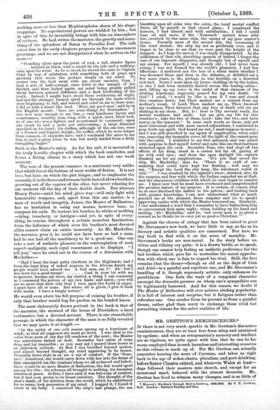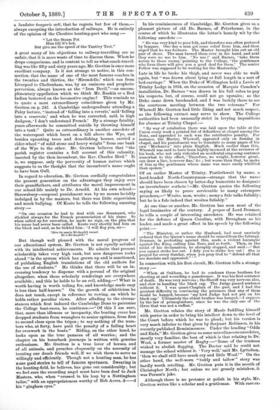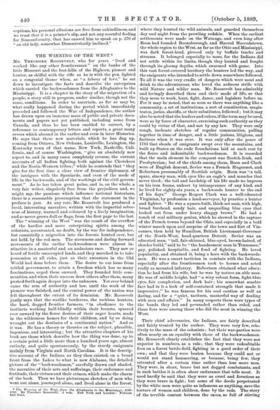MR. GRETTON'S REMINISCENCES.*
IF there is not very much sparkle in Mr. Gretton's discursive reminiscences, they are at least free from sting and untainted by egotism; and when an octogenarian's memory and intellect are so vigorous, we quite agree with him that he can be far- worse employed than in such harmless and interesting ecraseries as this volume is made up of. For Mr. Gretton can actually remember hearing the news of Coruna, and takes us right back to the age of sedan-chairs, pluralism, and port-drinking,. before Senior Classics existed, and when—in Wales at least— dogs followed their masters into church, and except for an occasional snarl, behaved with the utmost decorum. Mr., Gretton has lived to witness many changes, and is so little of • Memorg's Harlcback through Halta-Contury, 1808-1858. By F. E. Orators, B.D. London : Richard Bentley and Son. a laudator temporis acti, that he regrets but few of them,— always excepting the introduction of railways. He is entirely of the opinion of the Cheshire hunting-poet who sang:— "Let the Steam Pot Hiss till it's hot,
But give me the speed of the Tantivy Trot."
A great many of his objections to railway-travelling are so unfair, that it is mere waste of time to discuss them. When he
drops comparisons, and is content to tell us what coach-travel- ling was like fifty and sixty years ago, Mr. Gretton is once more excellent company. Is it not strange to notice, in this con- nection, that the name of one of the most famous coaches in the twenties and thirties, the Hirondelle,' which ran from Liverpool to Cheltenham, was, by an ominous and prophetic perversion, always known as the " Iron Devil,"—an uncom- plimentary appellation which we think Mr. Ruskin or a Red Indian bestowed on the locomotive engine P This reminds us to quote a most extraordinary coincidence given by Mr. Gretton on p. 242. A Cambridge undergraduate attending a Paley lecture, "instead of falling into a reverie,' said 'falling into a reservoir,' and when he was corrected, said, in high dudgeon, I don't understand French.' By a strange fatality, years afterwards he committed suicide by throwing himself into a tank." Quite as extraordinary is another anecdote of the waterspout which burst on a hill above the Wye, and besides uprooting trees and demolishing houses, carried a cider-wheel "of solid stone and heavy weight" from one bank of the Wye to the other. Mr. Gretton believes that "the parish register contains a full account of this calamity, inserted by the then incumbent, the Rev. Charles Bird." It is, we suppose, only the perversity of human nature which suggests to us the thoight that the incumbent's name ought to have been Gull.
In regard to education, Mr. Gretton cordially congratulates the present generation on the advantages they enjoy over their grandfathers, and attributes the moral improvement in our school-life mainly to Dr. Arnold. At his own school- Shrewsbury—corporal punishment was by no means lavishly indulged in by the masters, but there was little supervision and much bullying. Of Beate he tells the following amusing
story:— "On one occasion he had to deal with one Bosanquet, who stickled always for the French pronunciation of his name. So when called up for execution, he made no sign, on the plea that his name had never been called. Seats very shortly had him on the block and said, as he tickled him : will flog you, sir- ' Sive to =vie BONInqilEt vocari She 136.41106V *" But though well pleased with the moral progress of our educational system, Mr. Gretton is not equally satisfied with its intellectual achievements. He admits that present scholarship takes very high rank, but sees dangerous rocks ahead " in the system which has grown up and is sanctioned, of publishing English translations of the old authors for the use of students." He thinks that there will be an in- creasing tendency to dispense with a perusal of the original altogether, when these scholarly renderings are everywhere available ; and this he holds to be an evil, adding,—" What is worth having is worth toiling for, and knowledge made easy is less than half-known." On the growth of athleticism he does not touch, except in reference to rowing, on which he holds rather peculiar views. After alluding to the circum- stances which first induced the Cambridge Dons to patronise the College boat-races, he continues :—" Of this I am sure, that, more than idleness or incapacity, the boating craze has dropped students from wranglers to senior optimes, from first to second class upon the tripos ; to say nothing of the num- bers who, at forty, have paid the penalty of a failing heart for overwork in the boats." Riding, on the other hand, he looks upon as the true panacea of all worries ; and the chapter on his horseback journeys is written with genuine enthusiasm. Mr. Gretton is a true lover of horses, and of all animals, and preaches eloquently on the necessity of treating our dumb friends well, if we wish them to serve us willingly and efficiently. Though not a hunting man, he has some good stories to tell of famous sportsmen. Swearing in the hunting-field, he believes, has gone out considerably; but we feel sure the recording angel must have been deaf to Jack Masters, who, when "crossed in his leap by a Nottingham tailor," with an appropriateness worthy of Bob Acres, d—d his " gingham eyes."
In his reminiscences of Cambridge, Mr. Gretton gives us a pleasant picture of old Dr. Barnes, of Peterhonse, in the course of which he illustrates the latter's homely wit by the following anecdote :-
" He was very kind to poor folk, and therefore was often pestered by beggars. One day a man got some relief from him, and then urged that he was footsore. The Master brought him out an old pair of shoes. The man turned them over in his hand, and said they were no use to him. No use ?' said Barnes, take them across to those rooms,' pointing to the College, the gentleman who lives there will give you a good deal for them' The senior Fellow was supposed to be waiting for the Mastership."
Late in life he broke his thigh, and never was able to walk again, but " was drawn about lying at full length in a sort of bed-carriage." When the Duke of Wellington held a Levee at Trinity Lodge in 1834, on the occasion of Marquis Camden's installation, Dr. Barnes "was drawn in his full robes to pay his respects, but, of course, could not go upstairs ; so the Duke came down bareheaded, and I was luckily there to see the courteous meeting between the two veterans." For Whewell Mr. Gretton had little liking and not much respect, as the following extract may serve to show. The College authorities had been unusually strict in levying impositions for absence at Trinity Chapel :-
" By way of retaliation there was laid upon the table at the Union every week a printed list of defaulters at chapel among the Dons, and appended to each was the retributive penalty. For instance, the Master, Whewell, appeared only on Sunday in chapel, and his punishment was to translate so many pages of his own Mechanics' into plain English. Much earlier than this, Whewell was said to have been highly incensed at the reviewer of his book, who not only ridiculed an accidental sing-song sentence somewhat to this effect, Therefore, no weight, however great, can draw a line, however fine,' &c. ; but worse than that, he spoke of him as the gentleman whose name was more easily whistled than spoken."
Of an earlier Master of Trinity, Postlethwait by name, a hard-headed North-Countryman—strange that the name should have been chosen by latter-day humorists to designate an invertebrate aisthete !—Mr. Gretton quotes the following
saying as likely to prove serviceable to many extempore preachers,—" Wroite, mon, wroite ; mony a fule talks fulishly ; but he is a flak indeed that wroites fulishly."
At one time or another, Mr. Gretton has seen most of the legal luminaries of the century. A propos of Lord Denman, he tells a couple of interesting anecdotes. He was retained for the defence of Queen Caroline, with Brougham as his leader, and made a great effect in his speech by the following point:— "The Ministry, or rather the Husband, had most unwisely ordered that the Queen's name should be erased from the Liturgy. Denman, in protesting against this, made a violent harangue against the King, calling him Nero, and so forth. Then, in the midst of his declamation, he abruptly stopped, and said :—' But you cannot strike her out. I defy you to strike her out ! She is prayed for every Sunday, when you pray God to " defend all that are desolate and oppressed." '
In connection with.his first circuit, Mr. Gretton tells a strange story :—
" When at Oakham, he had to condemn three brothers for shooting at and wounding a gamekeeper. It was his first sentence of death. He was very nervous ; the Sheriff was very nervous also, and slow in handing the black cap. The Judge passed sentence without it. I was quasi-Chaplain of the gaol, and I had the greatest difficulty in convincing the prisoners that any of them would be hanged, because my lord Judge had not put on his black cap.' Ultimately the eldest brother was hanged,—I suppose by the law of primogeniture, since he was the only one of the three that was not a ruffian."
Mr. Gretton relates the story of Maule fuddling himself with porter in order to bring his intellect down to the level of the Court before which he was to plead; but his version is. very much inferior to that given by Serjeant Robinson, in his recently published Reminiscences. Under the heading "Odds and Ends," Mr. Gretton gives us some miscellaneous anecdotes, mostly very familiar, the best of which is that relating to Dr. Wool, a former master of Rugby :—" Some of the trustees wished to abolish flogging. The Doctor said he could not manage the school without it. Very well,' said Mr. Lyttelton, 'then we shall still have much cry and little Wool.'" On the other hand, the well-worn " toddy and tallow" story was
hardly worth retelling. Mr. Gretton puts it in the mouth of Christopher North ; but unless we are grossly mistaken, it was Porson's joke.
Although there is no pretence at polish in his style, Mr. Gretton writes like a scholar and a gentleman. With rare ex- ceptions, his personal allusions are free from unkindliness, and we trust that it is a printer's slip, and not any scornful feeling for Nonconformity, that has caused him to speak on p. 276 of " an old lady, somewhat Dissenterically inclined."








































 Previous page
Previous page